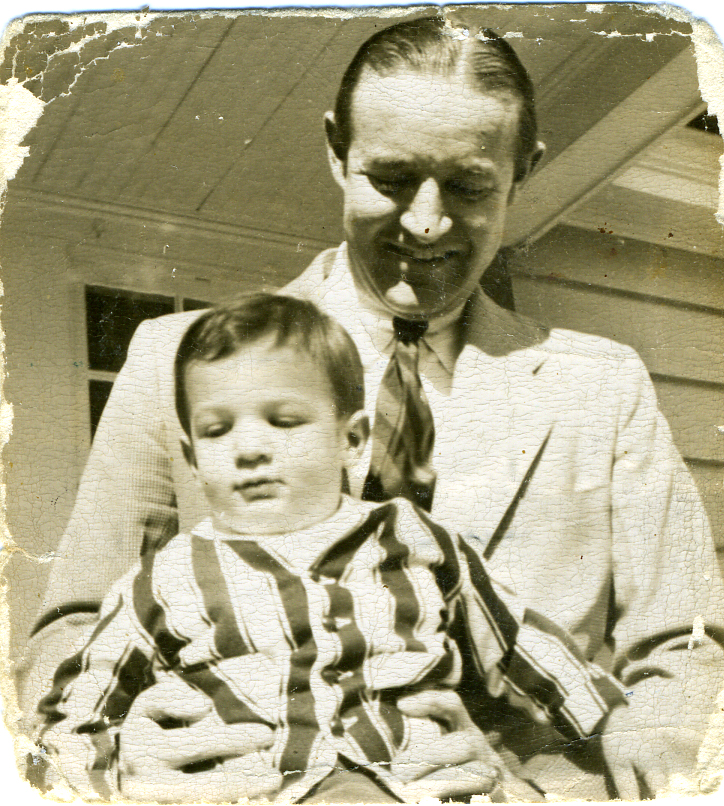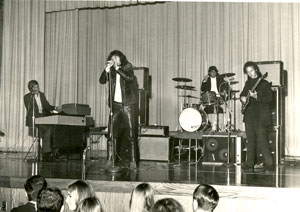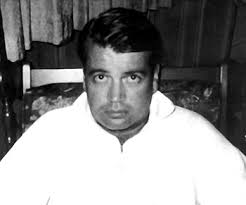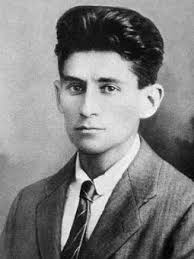My father was born in 1911. In many respects, he lived to become an exemplary 20th-century man. Through thick and thin, war and depression, he was able to embrace that century’s bewildering advances in technology, accept social change and maintain a keen, well-read grasp of world events. But when I think of him on a more personal level, I realize that he was also a gentleman of late Victorian refinements. He was outwardly modest and decorous in mixed company. He loathed vulgarity and displays of bad taste (with only a few endearing exceptions). He was an expert employer of euphemism, as I learned when he told me the facts of life, and a stickler for correct usage (“Everyone put on his or her napkin.”).

Of course I didn’t get to know him until after 1950, when I was born. My earliest memories are of a man who, among many other things, used garters to keep his socks up and shaved with a straight blade every morning. He liked to mow the lawn in summer while wearing shorts and long socks, like a Bahamian traffic officer. He drank scotch most of the year, but liked to shake up batches of rum cocktails in July and August. He loved fine clothes, and even in our small Connecticut city he had a longtime Italian tailor who made him beautiful bespoke suits and sport jackets.
As a civilized man of his time who was comfortable in his habits, my father either consciously or by osmosis passed along many of these things to me – ways of dressing, grooming, dining, drinking, living. Some I dismissed easily. I would never be one to wear a bowtie or a weekend Donegal cap, for example. Nor could I develop a taste for Richard Strauss or Spike Jones – or, for that matter, pungent, runny cheeses.
There were other, minor favorites and affectations he passed along that I have taken up, too, but do not feel the need to urge upon coming generations. He loved pistachio ice cream, for example, and so do I. He thought the character of Sir Jeffrey Dillon in the 1970s “Upstairs, Downstairs” TV series was marvelous, and so do I. When photographed outdoors, he liked to point randomly, as if calling attention to buildings or natural features of great interest that were just out of camera range – and so, as a sort of tribute to him, do I.
But there are some things he passed along to me that I do think are worthy of relaying forward to you. Not all of them carry equal weight or importance, of course, and some you may decide are downright trivial. But each in its own way contributes to the whole – to the way a man presents himself to the world, and to his friends and family – and has done for the past 50, or 80, or even 100 years. So take heed young man, it’s nothing less than the voice of civilization calling out to you.
The Manly Arts
At one time, the manly arts included things like swordplay, riding to hounds and the ability to stay awake and politely alert during interminable harpsichord recitals. Fortunately, by my father’s time, men had changed and their required duties had evolved as well. When I was 20 or so, I remember my father telling me – passing along to me, really – the following advice: “A man needs to know three basic things and know them well – how to mix a good drink, build a fire and carve a roast.” He may have been half kidding when he said it, but only half. And because this advice remains valid today, I pass it along to those who come after me, along with the very important proviso: If you want to get good, really good, at these manly arts, learn by doing.
Mix a Good Drink. This doesn’t mean conjuring up fancy cocktails unless you want it to. It really refers to the basics. Stock your bar well, acquire some good, solid drink glasses, be generous with all the ingredients, use plenty of ice when ice is called for, mix well with a long spoon rather than your index finger, remember people’s preferences and notice when they’re ready for another.
Build a Fire. This usually means having a fireplace, of course, and wood, but it can also mean being able to make a fire on the beach, at a campsite or even while wretched and alone on a dystopian plain. There is no single best way to arrange the fuel, but allow for some air circulation and remember that it’s always the kindling that’s key. I am old enough to have had a working fireplace in my college dorm room, where we used toilet paper rolls liberated from supply closets to get things going. You may not wish to do that, but tightly rolled or crumpled newspaper can do just as well, along with a generous bed of dry twigs and, if you want to cheat a bit, a fatwood stick or two.
Carve a Roast. You’ll need a sharp knife and a good carving board. I have a wooden one with spikes to hold the roast in place and several channels to carry the blood to its little trough. (My father enjoyed using the word “blood” at the dining table, as in “Would anyone like more blood on his or her roast beef or potatoes?” It was one of those infrequent vulgarities of his that somehow became endearing.) As for the actual procedure, be patient and work slowly, as a surgeon would. If you can hold the attention of the room with a few good stories as you carve, and take an occasional sip of your well-made drink, you only need to ask someone to throw another log onto the perfect fire you built to complete the Manly Man Trifecta.
A Strong Signature
I have always admired a fine signature – the flourish of John Hancock, the humble simplicity of Abraham Lincoln, the classic cornfed beauty of Mickey Mantle or Arnold Palmer – but it is legibility that I love most. Consequently, I have tried to keep my own signature solidly readable. After all, it is mine and mine only, my personal stamp. In this regard, I must also subconsciously take my cue from my own father and mother, whose signatures leave no doubt as to whom they belong. So you can imagine my concern when I see the squibs and scrawls with which so many young people sign things – they look more like the initials you sprinkle onto a rental car agreement than an actual signature. I hardly know what to say, except that I hope none of you is ever called upon to pen your name onto a Declaration of Independence or a baseball – years later people will look at it and say, “I wonder who that was.” Do I think you should change? Well, yes I do. You never took penmanship, I get it, but that doesn’t mean you can’t still build a legible, strong signature – one you can carry proudly forward into the rest of your life. Work on it. Embellish as you wish. In some quarters, it will be viewed as a measure of the man.
Parties With Live Music
By this, I don’t mean hiring a band; I mean playing instruments and singing – group and individual – by the guests themselves. Music was always a hallmark of the parties my parents gave, usually with a reliable hand at the piano and a stream of willing and not-so-willing singers rising up to give it their best. We’d listen to the music and laughter, and breathe in the cigarette smoke, from the top of the stairs. Not surprisingly some of our own best dinner parties or birthday celebrations over the decades have included live music (with my wife at the keyboard), and we’ve often been surprised by who, within the ranks of our friends, really loves to sing or play, and is good at it. The type of music doesn’t really matter – show tunes, pop, standards or Christmas carols – it’s the enthusiasm that counts, and the fact that guests will talk about these parties for a long time – sometimes years – afterward.
Pinaud Clubman Virgin Island Bay Rum
As mustard was once used primarily to disguise the smell and taste of meat that had gone off, so was cologne liberally splashed in the days before regular showering and effective deodorants came along. Today, the idea of wearing a personal scent is clearly one of choice rather than necessity, and I do succumb to it occasionally. When I do, I like to go old school, with what was once a staple (along with Pinaud stablemate Lilac Vegetal) of every good barbershop and country club locker room. It was also on the bottom shelf of my father’s medicine cabinet, along with Wildroot Cream Oil and Creamalin tablets. Bay Rum’s clovey fragrance will take you forward through the day as well as backward through the decades.
A Good Tweed Jacket
My father’s tailor was named Mike Fiore and his shop, with its low pools of light, broad, well-worn wooden table tops and bolts of fabric, was located on the second floor of a busy retail block in our downtown. Among the garments he made for my father was a greenish tweed jacket that held its style and shape for more than 30 years and always looked just right at a Saturday afternoon tailgate. Get yourself a tweed jacket, too, in a classic weave that doesn’t call too much attention to itself. Make sure it fits over a sweater. And pay enough for it so that you’ll never want to gain weight and grow out of it.
Bermuda
What I mean here is that you should find a place, other than your home, that you always carry in your heart. For me this is Bermuda, specifically its west end, where my family went for five straight summers when I was a little boy, and where I’ve returned many times since. The west end of Bermuda, Somerset, was a quiet place in the mid-1950s. The narrow lanes were nearly empty save for the occasional puttering motorbike, the Morris Minor taxis featured parasol-like roofs with fringes around the edges, the tree frogs sang their nightly chorus, and we could walk from houses called Felicity Hall or Cavello Hill to deserted little sandy inlets for swimming and adventures in the coral outcroppings. As we did so, Bermuda got inside us and became “ours.” Do that for yourself and your family, whether it’s an island in Maine, a mountain hideaway, a place on the lake, an apartment in Paris – as long as it’s not a condo in Orlando.
W.C. Fields
I understand that tastes and fashions change, but I hate to see things get discarded or lost for no good reason. Black and white movies are a hard sell these days, but if I may be allowed to reclaim one of my father’s and my favorites from the cultural rubble pile, I’d like it to be W.C. Fields. Watch him in “The Bank Dick” or “It’s a Gift,” or even just a YouTube short like “The Diner Sketch,” and you will see a mean, cynical, insincere, dishonest, often inebriated deadbeat who also happens to be sublimely, inventively funny. The pace is ancient and slow, yes, it’s black and white and the plotting is usually nonsensical, but it’s W.C. Fields, man. Don’t let him just disappear!
Keep a Journal
My father sporadically kept a journal throughout his life. He tended to write more when he was single than after he was married and had a family, but you could tell that every once in a while he resolved to get back to it and did so. The result has been a feast for those who have followed him, including not just sketches from his personal life but also his takes on books, movies and world and local events. Right now, as World War II marks 75 years, I’ve been reading and posting sections of his journal on Pearl Harbor, our industrial hometown gearing up for war, and, eventually, on and on all the way to VJ Day. I have been far less industrious with my own journal-keeping and sometimes have limited it just to specific events. My kids loved reading my on-the-spot take on the Blizzard of 1978, for instance. You can think of it as writing a letter to yourself, one that you’ll take out and read many years from now. You’ll be amazed by the details – and important things, too – that you otherwise would have forgotten over time.
German Beer
It’s pretty obvious that there are way too many beers and breweries these days, more than anyone can possibly keep track of, much less drink, so maybe it’s time to go back to the best. According to my father, German beer was always king. I remember around age 12 having lunch with him at Lüchow’s, a venerable old German oom-pah restaurant located on 14th Street in Manhattan. He ordered a Löwenbräu, and to my embarrassment pronounced it as if he were in Germany. But when it came to the table in its towering stein, he allowed me a sip through its foamy, hoppy head, and ever since I’ve believed that that’s what good beer should smell and taste like. Of course, Löwenbräu was later bought up by an American beer company and its formula ignored and destroyed, but many, many other great German brews remain. You can show you’re at the top of your game by pulling out some frosty bottles of Weihenstephaner Hefeweissbier at your next get-together.
Learn Something by Heart
My family – my mother, brother and sisters – were standing around the foot of my father’s hospital bed as he lay dying at age 93. We’d been chatting aimlessly, catching up, speaking in hushed tones, when we became aware of a low, droning voice rising from behind us. We turned to find it was Dad, giving it one last go, reciting from memory Tennyson’s “Crossing the Bar”:
“. . . Twilight and evening bell,
And after that the dark!
And may there be no sadness of farewell,
When I embark . . .”
It was impossible to know how long he’d been planning this moment, or if it had just occurred to him on the spot. We never got a chance to ask him about it. But it was a powerful, unforgettable moment, and it was made possible by his generation’s tradition of learning things – poems, songs, Shakespeare soliloquies – by heart. As with penmanship, that sort of learning isn’t taught much in school anymore, but an ability to come up with a perfect few lines of poetry or prose at an opportune moment can set you apart. You could even be loved and remembered for it.
The Tie Bar
As Donald Trump campaigned last fall, a photo of him circulated on the Internet in which a gust of wind had caught his ubiquitous necktie, flipped it over, and revealed that the two ends were being held together by several strips of Scotch tape. How gauche! How tacky! How easily avoided with the use of a handsome tie bar! The tie bar was used by men in my father’s day to prevent just the sort of wild, disorganized flapping that DJT has become famous for. Several bars would normally be housed together in a tiny leather box on top of the dresser. My father often wore the “PT 109” bar that had been given to him by President Kennedy. The one passed along to me was an LBJ 10-gallon hat (we were a political family), but I have some of my own, too. Wearing one – not too high, not too low – will give you an air of throwback self-possession that others will envy, whether you deserve it or not.
Poems and Songs
Here are some very natural pass-alongs – poems and songs that have in some cases been cast aside but are deserving of much longer lives. There were many, many that he loved and knew well in each category.
Poems. There are three I remember hearing and reading while literally seated on my father’s lap: “Danny Deever” by Rudyard Kipling, “To an Athlete Dying Young” by A. E. Housman, and “Barbara Frietchie” by John Greenleaf Whittier. Here my father betrayed his Victorian leanings (they are all 19th-century compositions), as well as his sentimental side. They are uncomplicated works and easy to understand, which is probably why he chose them to share with his young son. But he truly enjoyed them, and loved repeating the rhyming lines and going over their stories with me. One thing those sessions achieved was to teach me not to be afraid of poetry. When I come across a poem in a magazine these days, I don’t avert my eyes and hustle past it as if it were roadkill – I give it a try.
Songs. My father was a piano player (he insisted on that description rather than “pianist”) and an enthusiastic singer with an astoundingly deep well of songs and lyrics at his disposal, from obscure college fight songs to Maria Callas, and from Leadbelly to Gilbert and Sullivan. From his vast store, here are three of his very favorites for you to adopt and appreciate: “Streets of Laredo” tells a devastating story of early death (much like the Housman poem named above); “Brother, Can You Spare a Dime?” is a tough, tough tale of life during the Great Depression; and “Stalin Wasn’t Stallin’” as performed by the Golden Gate Quartet returns to the long-ago days when Stalin and the Soviet Union were viewed as great allies of America in the joint battle against Hitler. There’s not just melody in these three songs, but American history, too.
 The puttylike substance was nothing new. It had been around since 1943, when James Wright, laboring in a General Electric laboratory to come up with a cheap synthetic rubber substitute, happened to drop boric acid into silicone oil, and up sprang a substance that bounced higher and stretched even further than rubber – too high and too far, perhaps, for any practical use. Although GE shared the new discovery with scientists around the world, none showed any interest in developing it. The “nutty putty,” as it was called, remained a curiosity.
The puttylike substance was nothing new. It had been around since 1943, when James Wright, laboring in a General Electric laboratory to come up with a cheap synthetic rubber substitute, happened to drop boric acid into silicone oil, and up sprang a substance that bounced higher and stretched even further than rubber – too high and too far, perhaps, for any practical use. Although GE shared the new discovery with scientists around the world, none showed any interest in developing it. The “nutty putty,” as it was called, remained a curiosity.











